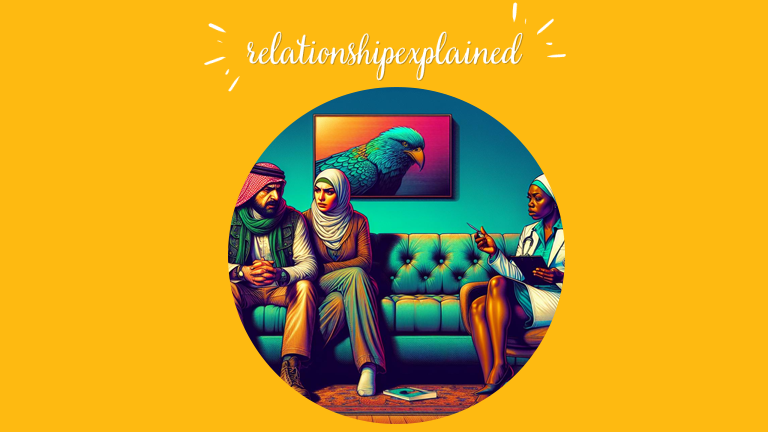Too Much Freedom in Relationships
Finding the sweet spot between freedom and connection in a relationship can feel like walking a tightrope. Too much freedom can lead to feelings of disconnection and neglect, while too little can cause suffocation and loss of individuality. Striking a balance is key to nurturing a relationship that's both secure and liberating. Well, we'll be […]
Finding the sweet spot between freedom and connection in a relationship can feel like walking a tightrope. Too much freedom can lead to feelings of disconnection and neglect, while too little can cause suffocation and loss of individuality. Striking a balance is key to nurturing a relationship that's both secure and liberating.
Well, we'll be going over:
- How do you define and respect personal space while maintaining intimacy in a relationship?
- What are the ways to communicate your need for independence without alienating your partner?
- How can setting boundaries enhance the sense of freedom within a committed relationship?
Let's dive in.
Key Takeaways
- Defining freedom in relationships can be challenging, but it generally refers to having the ability to make choices independently of your partner.
- Maintaining a healthy balance of freedom and boundaries is crucial for a happy and healthy relationship.
- Communication and negotiation are key to finding a balance of freedom that works for both partners.
Defining Freedom in Relationships
When it comes to relationships, freedom is a term that can be interpreted in many ways. It can mean different things to different people, and it can be a source of both joy and conflict in a relationship. In this section, we will explore what freedom means in the context of a relationship.
Understanding Personal Freedom
Personal freedom is the ability to make choices and decisions for yourself without external influence or control. This can include decisions about your career, hobbies, friendships, and other aspects of your life. In a relationship, personal freedom is important because it allows you to maintain your sense of self and independence. It is essential for both partners to have the freedom to pursue their individual interests and goals.
However, too much personal freedom can also be detrimental to a relationship. If one partner has too much freedom, it can lead to a sense of neglect or abandonment in the other partner. It is important to find a balance between personal freedom and togetherness in a relationship.
Balancing Individuality and Togetherness
Balancing individuality and togetherness is a key aspect of a healthy relationship. While personal freedom is important, it is equally important to have a sense of togetherness and shared experiences. This can include spending quality time together, sharing common interests, and supporting each other's goals and aspirations.
Communication is the key to finding the right balance between personal freedom and togetherness in a relationship. It is important to have open and honest conversations about your needs and expectations. This can help to avoid misunderstandings and conflicts in the relationship.
In conclusion, freedom is an important aspect of any relationship. It allows both partners to maintain their sense of self and independence. However, it is important to find a balance between personal freedom and togetherness to ensure a healthy and fulfilling relationship.
The Importance of Boundaries
Boundaries are an essential aspect of any relationship. They help define the limits of what is acceptable and what is not. Establishing healthy boundaries is crucial to maintaining a healthy relationship. It can help you and your partner feel safe, respected, and valued.
Establishing Healthy Boundaries
Establishing healthy boundaries requires clear communication and mutual understanding. You and your partner should sit down and discuss what you are comfortable with and what you are not. This will help you both understand each other's needs and expectations.
Healthy boundaries can include setting limits on how much time you spend together, what kind of physical contact is acceptable, and how much personal information you share. It is important to remember that boundaries are not about controlling your partner but about respecting each other's needs.
Respecting Each Other's Needs
Respecting each other's needs is an essential component of establishing healthy boundaries. It is important to create boundaries that work for both of you. This means that you should be willing to compromise and make adjustments when necessary.
Respect is also a crucial element in maintaining healthy boundaries. You must respect your partner's boundaries and expect the same in return. If either of you violates the established boundaries, it can lead to a breakdown in trust and a damaged relationship.
In conclusion, boundaries are an essential aspect of any relationship. Establishing healthy boundaries requires clear communication, mutual understanding, and respect for each other's needs. By creating and maintaining healthy boundaries, you can help ensure that your relationship is safe, respectful, and fulfilling for both you and your partner.
Communication and Negotiation
When it comes to relationships, communication and negotiation are essential components to maintaining healthy dynamics. Effective communication strategies can help you express your needs and desires while also understanding your partner's perspective. It's important to actively listen to your partner and validate their feelings, even if you don't agree with them. This can help build trust and respect in the relationship.
Effective Communication Strategies
When communicating with your partner, it's important to be clear and concise. Use "I" statements to express how you feel rather than blaming or accusing your partner. This can help avoid defensiveness and conflict. Additionally, active listening involves paying attention to your partner's nonverbal cues and responding appropriately. This can help you understand their perspective and avoid misunderstandings.
The Role of Compromise in Freedom
Negotiation is also an important aspect of any relationship. It involves finding a balance between your needs and your partner's needs. Compromise is a crucial part of negotiation, as it allows both partners to feel heard and respected. However, compromising too much can lead to resentment and a loss of freedom. It's important to find a balance between compromise and maintaining your own individuality.
When making decisions in a relationship, it's important to consider both partners' needs and desires. This can involve discussing and compromising on important issues such as finances, family planning, and career goals. Support is also crucial in any relationship. It involves being there for your partner during both good times and bad. This can help build a strong foundation of trust and respect in the relationship.
Overall, effective communication and negotiation can help maintain a healthy balance of freedom and compromise in a relationship. By actively listening to your partner, expressing your needs and desires, and finding a balance between compromise and individuality, you can build a strong and lasting relationship.
Challenges of Excessive Freedom
In any relationship, having a certain level of freedom is healthy and necessary. However, too much freedom can lead to challenges that can be difficult to overcome. Here are some challenges that come with excessive freedom in a relationship.
Dealing with Fear and Insecurity
When there is too much freedom in a relationship, one partner may start to feel insecure and fearful. They may worry that their partner is not committed to the relationship or that they are not interested in them anymore. This fear and insecurity can lead to a breakdown in communication and trust, which can be difficult to repair.
To deal with this challenge, it is important to have open and honest communication with your partner. Talk about your fears and insecurities and try to find ways to address them together. This can help to build trust and strengthen your relationship.
Avoiding Emotional Dependence
Another challenge of excessive freedom in a relationship is the risk of emotional dependence. When one partner has too much freedom, they may start to rely on their partner for emotional support and validation. This can put a lot of pressure on the relationship and can lead to feelings of resentment and frustration.
To avoid emotional dependence, it is important to have a healthy balance of independence and togetherness in your relationship. Make sure that you are both pursuing your own interests and hobbies, while also spending quality time together. This can help to build a strong and healthy relationship, without the risk of emotional dependence.
In conclusion, while having freedom in a relationship is important, too much of it can lead to challenges that can be difficult to overcome. By addressing these challenges head-on and finding ways to build trust and maintain independence, you can create a strong and healthy relationship that will last for the long-term.
Maintaining a Healthy Balance
In a relationship, the balance between love and freedom is crucial to maintain a healthy and happy partnership. While love is the foundation of any healthy relationship, too much freedom can sometimes lead to problems. It is important to find a balance between the two to ensure that your relationship is healthy, supportive, and fulfilling.
The Interplay of Love and Freedom
Love and freedom are intertwined in a healthy relationship. Love provides the foundation for the relationship, while freedom allows each partner to grow and develop as individuals. However, too much freedom can sometimes lead to a lack of commitment, trust, and intimacy. On the other hand, too much love can lead to codependency and a lack of personal growth. It is important to find the right balance between the two to ensure a healthy and supportive relationship.
Fostering Mutual Growth and Support
One way to maintain a healthy balance between love and freedom is to foster mutual growth and support. This means supporting each other's personal goals and aspirations, while also working together to achieve shared goals. By doing this, you can help each other grow and develop as individuals, while also strengthening your bond as a couple.
Another important aspect of maintaining a healthy balance is to communicate openly and honestly with each other. This means being transparent about your feelings, needs, and expectations, and working together to find solutions that work for both of you. By doing this, you can build a strong foundation of trust and respect, while also ensuring that your relationship is fulfilling and joyful.
In conclusion, maintaining a healthy balance between love and freedom is crucial to building a healthy and happy relationship. By fostering mutual growth and support, communicating openly and honestly, and finding the right balance between love and freedom, you can build a strong foundation for your relationship that will last a lifetime.
Frequently Asked Questions
How can partners maintain individual independence while in a relationship?
Maintaining individual independence is crucial to a healthy relationship. Both partners should respect each other's personal space, interests, and hobbies. It is important to have open communication and set healthy boundaries.
What are the signs that a relationship is restricting personal freedom?
Signs that a relationship is restricting personal freedom include feeling trapped, controlled, or suffocated. You may feel like you are walking on eggshells or unable to express yourself freely. It is important to recognize these signs and address them with your partner.
How does one balance the need for freedom with commitment in marriage?
Balancing the need for freedom with commitment in marriage requires open communication and compromise. Both partners should be willing to make adjustments to accommodate each other's needs. It is important to respect each other's personal space and interests while maintaining a strong commitment to the relationship.
What are the consequences of not having enough personal space in a relationship?
Not having enough personal space in a relationship can lead to feelings of resentment, frustration, and suffocation. It can also lead to a loss of individual identity and a lack of personal growth. It is important to have healthy boundaries and respect each other's personal space.
How can couples address fears of losing their independence when in a relationship?
Couples can address fears of losing their independence by having open and honest communication. It is important to express your feelings and concerns to your partner. You can also set healthy boundaries and establish a sense of trust and respect in the relationship.
What strategies can be employed to ensure both partners feel free and unconfined?
Strategies that can be employed to ensure both partners feel free and unconfined include setting healthy boundaries, respecting each other's personal space and interests, and having open communication. It is important to have a sense of trust and respect in the relationship and to make adjustments to accommodate each other's needs.












